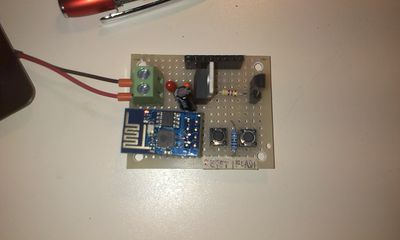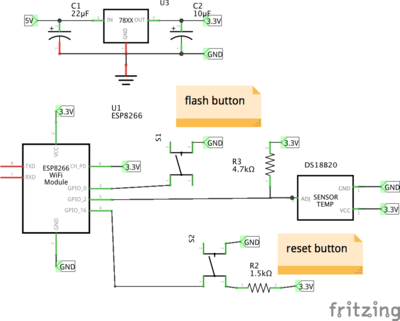Differenze tra le versioni di "ESP8266/templogger"
| Riga 17: | Riga 17: | ||
Scaricare l'ultima versione di Nodemcu e attraverso ESPlorer caricare i tre sketch lua | Scaricare l'ultima versione di Nodemcu e attraverso ESPlorer caricare i tre sketch lua | ||
| − | == ds18b20.lua == | + | ==== ds18b20.lua ==== |
-------------------------------------------------------------------------------- | -------------------------------------------------------------------------------- | ||
-- DS18B20 one wire module for NODEMCU | -- DS18B20 one wire module for NODEMCU | ||
| Riga 152: | Riga 152: | ||
return M | return M | ||
| − | == postThingSpeak.lua == | + | ==== postThingSpeak.lua ==== |
function postThingSpeak(level) | function postThingSpeak(level) | ||
| Riga 180: | Riga 180: | ||
Sostituire CHIAVE con la chiave ottenuta dalla registrazione su Thingspeak.com | Sostituire CHIAVE con la chiave ottenuta dalla registrazione su Thingspeak.com | ||
| − | == init.lua == | + | ==== init.lua ==== |
--init.lua | --init.lua | ||
require("postThingSpeak") | require("postThingSpeak") | ||
| Riga 207: | Riga 207: | ||
Sostiture ssid e pw con il nome del access point e la password | Sostiture ssid e pw con il nome del access point e la password | ||
| + | |||
| + | |||
| + | === ThingSpeak === | ||
| + | |||
| + | https://thingspeak.com/channels/32934 | ||
Versione delle 16:23, 1 mag 2015
esp8266 temp logger
L'ESP8266 può essere utilizzato come microcontrollore standalone con il firmware Nodemcu. Grazie ai due GPIO pins si possono collegare sensori di temperatura, led, relè o altro. In questo esempio il GPIO2 è collegato ad un sensore DS18B20 per la misurazione della temperatura e ogni 30 secondi la lettura viene inviata a ThingSpeak
Schema elettrico
Consiglio di alimentare ESP8266 attraverso un alimentatore dedicato, non utilizzare i collegamenti forniti da altro micro controllore tipo Arduino, nè quelli del convertitore USB-TTL.
Nella millefori è utile predisporre anche le uscite dei pin RX, TX, GND, GPIO2, GPIO0 in modo da avere massima flessibilità e poter facilmente collegare l'unità per la programmazione oppure per sperimentare con le uscite.
Firmware
Collegare TX del convertitore USB-TTL a RX del ESP8266 e RX del convertitore a TX del ESP8266. Nota: il convertitore deve funzionare 3,3V e non a 5V!
Scaricare l'ultima versione di Nodemcu e attraverso ESPlorer caricare i tre sketch lua
ds18b20.lua
-------------------------------------------------------------------------------- -- DS18B20 one wire module for NODEMCU -- NODEMCU TEAM -- LICENCE: http://opensource.org/licenses/MIT -- Vowstar <vowstar@nodemcu.com> -- 2015/02/14 sza2 <sza2trash@gmail.com> Fix for negative values -------------------------------------------------------------------------------- -- Set module name as parameter of require local modname = ... local M = {} _G[modname] = M -------------------------------------------------------------------------------- -- Local used variables -------------------------------------------------------------------------------- -- DS18B20 dq pin local pin = nil -- DS18B20 default pin local defaultPin = 9 -------------------------------------------------------------------------------- -- Local used modules -------------------------------------------------------------------------------- -- Table module local table = table -- String module local string = string -- One wire module local ow = ow -- Timer module local tmr = tmr -- Limited to local environment setfenv(1,M) -------------------------------------------------------------------------------- -- Implementation -------------------------------------------------------------------------------- C = 0 F = 1 K = 2 function setup(dq) pin = dq if(pin == nil) then pin = defaultPin end ow.setup(pin) end function addrs() setup(pin) tbl = {} ow.reset_search(pin) repeat addr = ow.search(pin) if(addr ~= nil) then table.insert(tbl, addr) end tmr.wdclr() until (addr == nil) ow.reset_search(pin) return tbl end function readNumber(addr, unit) result = nil setup(pin) flag = false if(addr == nil) then ow.reset_search(pin) count = 0 repeat count = count + 1 addr = ow.search(pin) tmr.wdclr() until((addr ~= nil) or (count > 100)) ow.reset_search(pin) end if(addr == nil) then return result end crc = ow.crc8(string.sub(addr,1,7)) if (crc == addr:byte(8)) then if ((addr:byte(1) == 0x10) or (addr:byte(1) == 0x28)) then -- print("Device is a DS18S20 family device.") ow.reset(pin) ow.select(pin, addr) ow.write(pin, 0x44, 1) -- tmr.delay(1000000) present = ow.reset(pin) ow.select(pin, addr) ow.write(pin,0xBE,1) -- print("P="..present) data = nil data = string.char(ow.read(pin)) for i = 1, 8 do data = data .. string.char(ow.read(pin)) end -- print(data:byte(1,9)) crc = ow.crc8(string.sub(data,1,8)) -- print("CRC="..crc) if (crc == data:byte(9)) then t = (data:byte(1) + data:byte(2) * 256) if (t > 32767) then t = t - 65536 end if(unit == nil or unit == C) then t = t * 625 elseif(unit == F) then t = t * 1125 + 320000 elseif(unit == K) then t = t * 625 + 2731500 else return nil end t = t / 10000 -- print("Temperature="..t1.."."..t2.." Centigrade") -- result = t1.."."..t2 return t end tmr.wdclr() else -- print("Device family is not recognized.") end else -- print("CRC is not valid!") end return result end function read(addr, unit) t = readNumber(addr, unit) if (t == nil) then return nil else return t end end -- Return module table return M
postThingSpeak.lua
function postThingSpeak(level)
conn=net.createConnection(net.TCP, 0)
conn:on("receive", function(conn, payload)
if (string.find(payload, "Status: 200 OK") ~= nil) then
print("Posted OK");
end
end)
conn:on("connection", function(connout, payloadout)
print ("Posting...");
conn:send("GET /update?api_key=CHIAVE&field1=" .. level
.. " HTTP/1.1\r\n"
.. "Host: api.thingspeak.com\r\n"
.. "Connection: close\r\n"
.. "Accept: */*\r\n"
.. "User-Agent: Mozilla/4.0 (compatible; esp8266 Lua; Windows NT 5.1)\r\n"
.. "\r\n")
end)
conn:on("disconnection", function(connout, payloadout)
connout:close();
collectgarbage();
end)
conn:connect(80,'184.106.153.149') -- api.thingspeak.com 184.106.153.149
end
Sostituire CHIAVE con la chiave ottenuta dalla registrazione su Thingspeak.com
init.lua
--init.lua
require("postThingSpeak")
ledPin = 3 --> GPIO0
value = gpio.LOW
-- Initialise the pin
gpio.mode(ledPin, gpio.OUTPUT)
gpio.write(ledPin, value)
print("Setting up WIFI...")
wifi.setmode(wifi.STATION)
wifi.sta.config("ssid","pw")
wifi.sta.connect()
tmr.alarm(1, 30*1000, 1, function()
t = require("ds18b20")
tempPin = 4 --> GPIO2
t.setup(tempPin)
temp = t.read()
print("Temperature: "..temp.."C")
print("Sending data to thingspeak.com")
postThingSpeak(temp)
-- Don't forget to release it after use
t = nil
ds18b20 = nil
package.loaded["ds18b20"]=nil
end)
Sostiture ssid e pw con il nome del access point e la password

